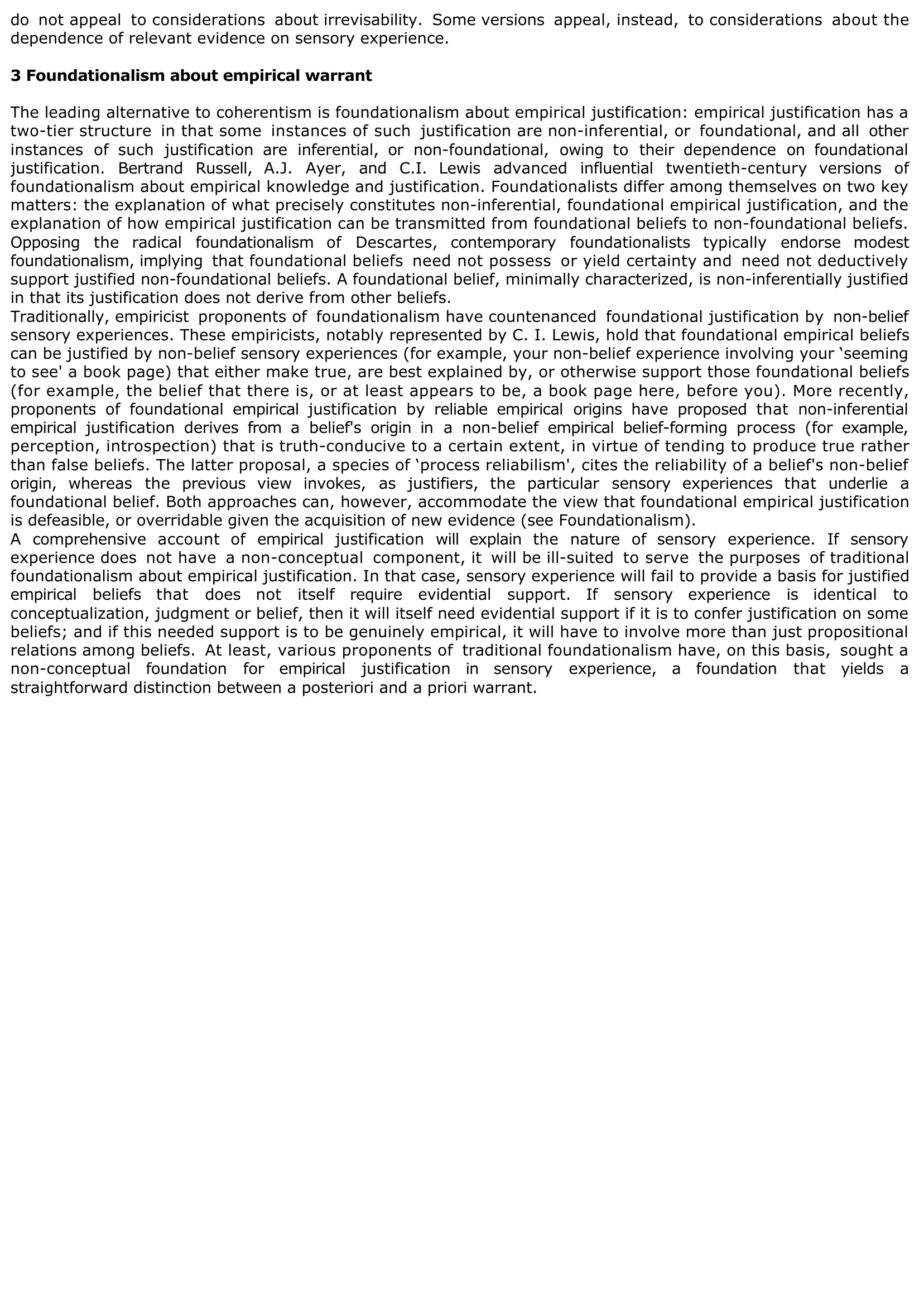Encyclopedia of Philosophy: A posteriori ?
Publié le 12/01/2010
Extrait du document
A POSTERIORI
A partir de ce qui suit, ce qui est conclu des effets. Une connaissance est dite a posteriori quand on conclut après expérience et d'après ce qu'on tire de cette expérience (les corps sont pesants, les cellules nerveuses ne se reproduisent pas...).
On nomme a posteriori, la preuve qui conclut l'existence de Dieu de l'existence du monde prise comme un effet qui doit résulter d'une cause. Une connaissance déterminée est donc toujours a posteriori par son contenu et ses résultats (autant qu'elle ne produit pas elle-même la réalité de son contenu).
Par contre, le fait même de connaître ne peut pas être dit a posteriori, puisqu'on ne peut trouver de principe de connaissance hors de la connaissance.
A prominent term in theory of knowledge since the seventeenth century, ‘a posteriori’ signifies a kind of knowledge or justification that depends on evidence, or warrant, from sensory experience. A posteriori truth is truth that cannot be known or justified independently of evidence from sensory experience, and a posteriori concepts are concepts that cannot be understood independently of reference to sensory experience. A posteriori knowledge contrasts with a priori knowledge, knowledge that does not require evidence from sensory experience. A posteriori knowledge is empirical, experience-based knowledge, whereas a priori knowledge is non-empirical knowledge. Standard examples of a posteriori truths are the truths of ordinary perceptual experience and the natural sciences; standard examples of a priori truths are the truths of logic and mathematics. The common understanding of the distinction between a posteriori and a priori knowledge as the distinction between empirical and non-empirical knowledge comes from Kant’s Critique of Pure Reason (1781/1787).
«
do not appeal to considerations about irrevisability.
Some versions appeal, instead, to considerations about thedependence of relevant evidence on sensory experience.
3 Foundationalism about empirical warrant
The leading alternative to coherentism is foundationalism about empirical justification: empirical justification has atwo-tier structure in that some instances of such justification are non-inferential, or foundational, and all otherinstances of such justification are inferential, or non-foundational, owing to their dependence on foundationaljustification.
Bertrand Russell, A.J.
Ayer, and C.I.
Lewis advanced influential twentieth-century versions offoundationalism about empirical knowledge and justification.
Foundationalists differ among themselves on two keymatters: the explanation of what precisely constitutes non-inferential, foundational empirical justification, and theexplanation of how empirical justification can be transmitted from foundational beliefs to non-foundational beliefs.Opposing the radical foundationalism of Descartes, contemporary foundationalists typically endorse modestfoundationalism, implying that foundational beliefs need not possess or yield certainty and need not deductivelysupport justified non-foundational beliefs.
A foundational belief, minimally characterized, is non-inferentially justifiedin that its justification does not derive from other beliefs.Traditionally, empiricist proponents of foundationalism have countenanced foundational justification by non-beliefsensory experiences.
These empiricists, notably represented by C.
I.
Lewis, hold that foundational empirical beliefscan be justified by non-belief sensory experiences (for example, your non-belief experience involving your ‘seemingto see' a book page) that either make true, are best explained by, or otherwise support those foundational beliefs(for example, the belief that there is, or at least appears to be, a book page here, before you).
More recently,proponents of foundational empirical justification by reliable empirical origins have proposed that non-inferentialempirical justification derives from a belief's origin in a non-belief empirical belief-forming process (for example,perception, introspection) that is truth-conducive to a certain extent, in virtue of tending to produce true ratherthan false beliefs.
The latter proposal, a species of ‘process reliabilism', cites the reliability of a belief's non-belieforigin, whereas the previous view invokes, as justifiers, the particular sensory experiences that underlie afoundational belief.
Both approaches can, however, accommodate the view that foundational empirical justificationis defeasible, or overridable given the acquisition of new evidence (see Foundationalism).A comprehensive account of empirical justification will explain the nature of sensory experience.
If sensoryexperience does not have a non-conceptual component, it will be ill-suited to serve the purposes of traditionalfoundationalism about empirical justification.
In that case, sensory experience will fail to provide a basis for justifiedempirical beliefs that does not itself require evidential support.
If sensory experience is identical toconceptualization, judgment or belief, then it will itself need evidential support if it is to confer justification on somebeliefs; and if this needed support is to be genuinely empirical, it will have to involve more than just propositionalrelations among beliefs.
At least, various proponents of traditional foundationalism have, on this basis, sought anon-conceptual foundation for empirical justification in sensory experience, a foundation that yields astraightforward distinction between a posteriori and a priori warrant..
»
↓↓↓ APERÇU DU DOCUMENT ↓↓↓
Liens utiles
- Encyclopedia of Philosophy: al-Ghazali, Abu Hamid
- Encyclopedia of Philosophy: al-Farabi, Abu Nasr
- Encyclopedia of Philosophy: Alexander, Samuel
- Encyclopedia of Philosophy: Alexander of Hales
- Encyclopedia of Philosophy: Alexander of Aphrodisias

































